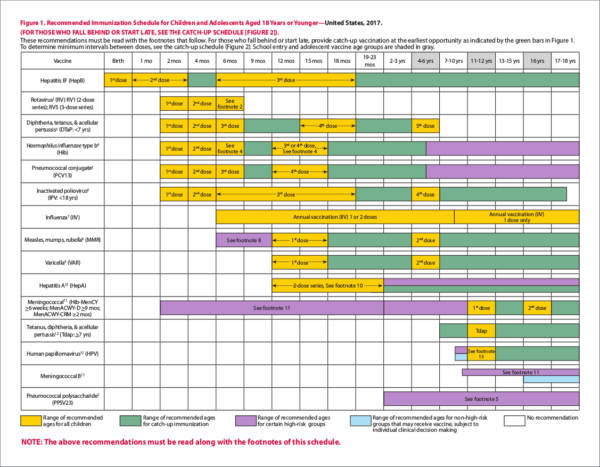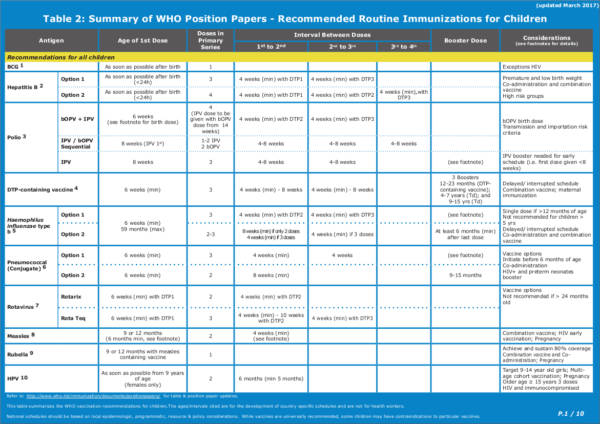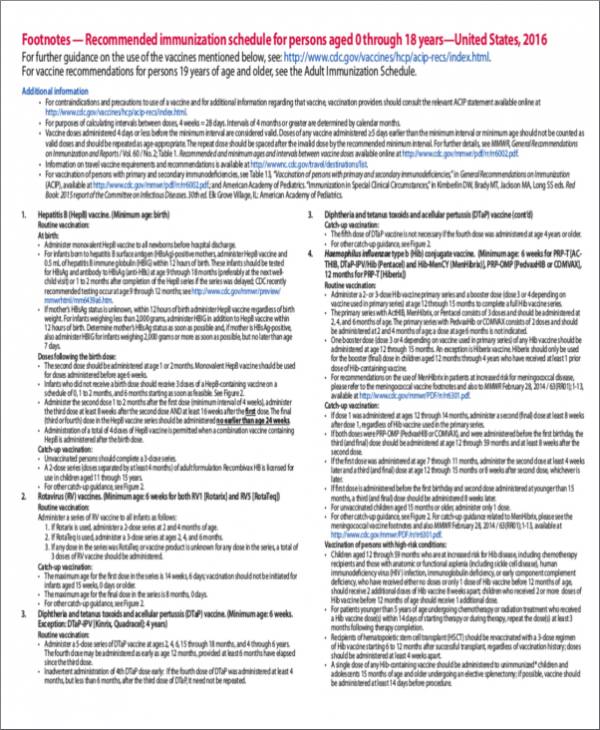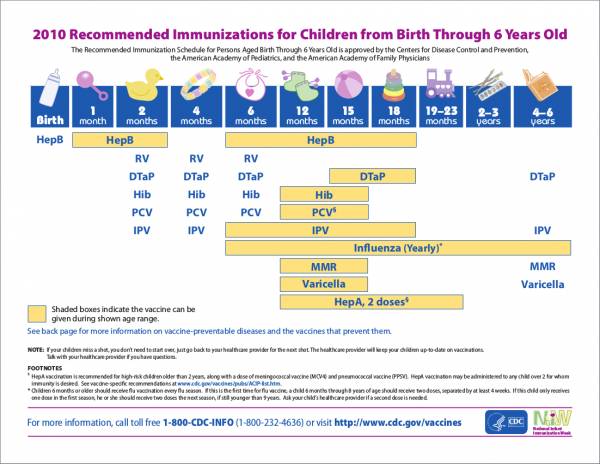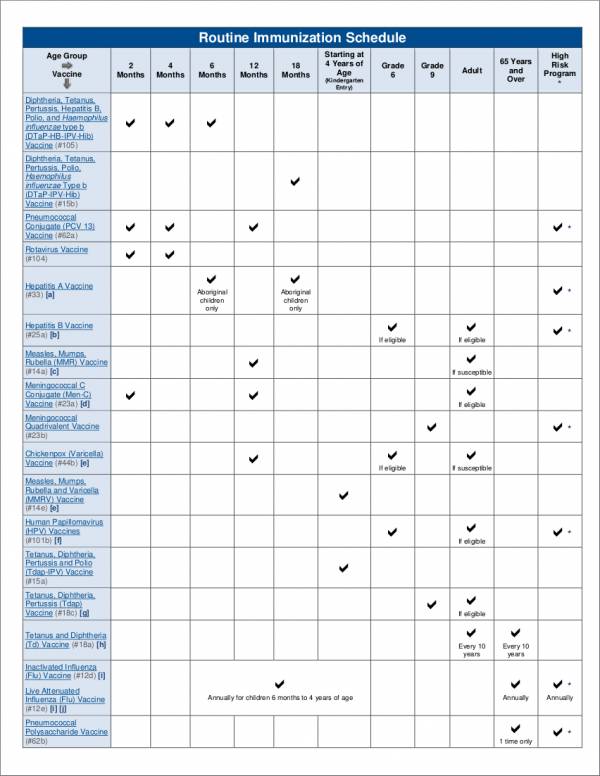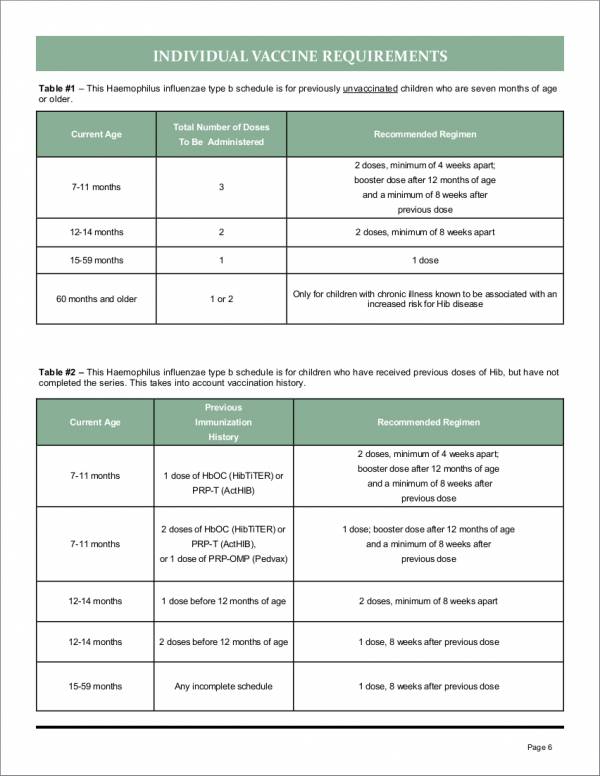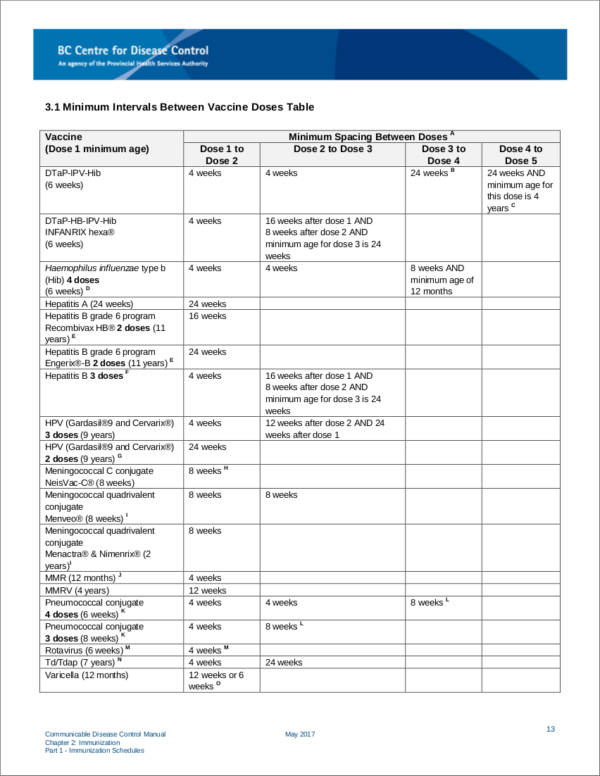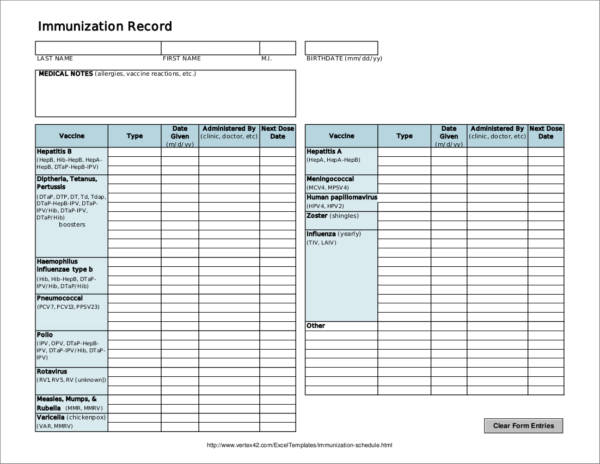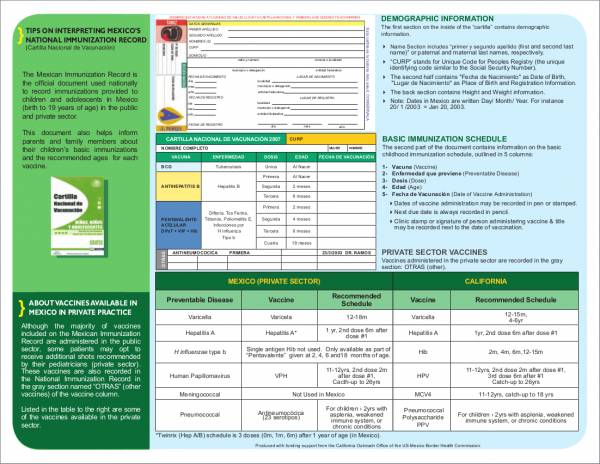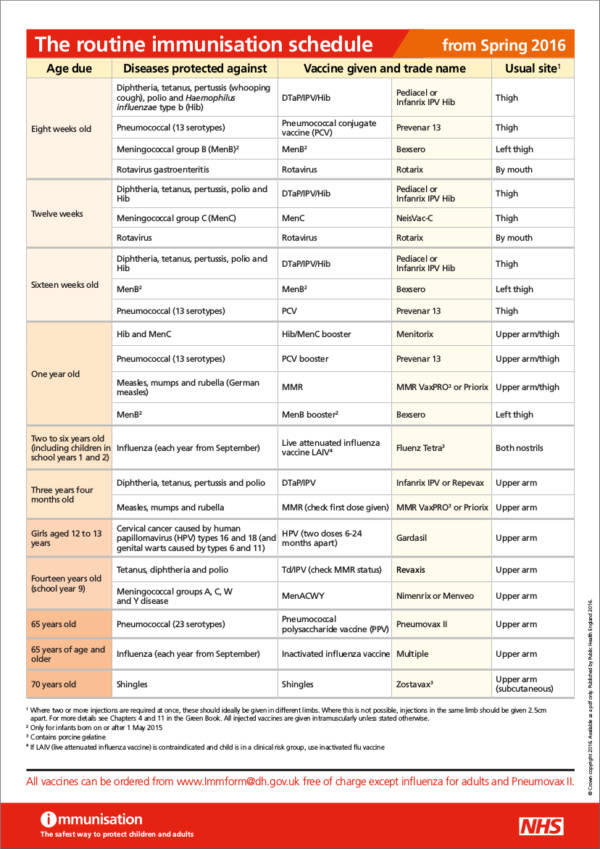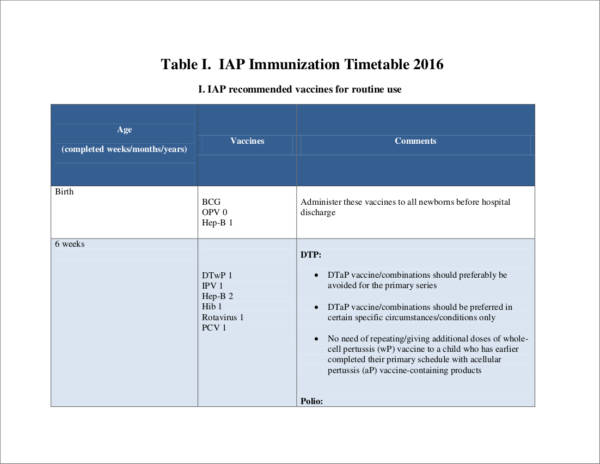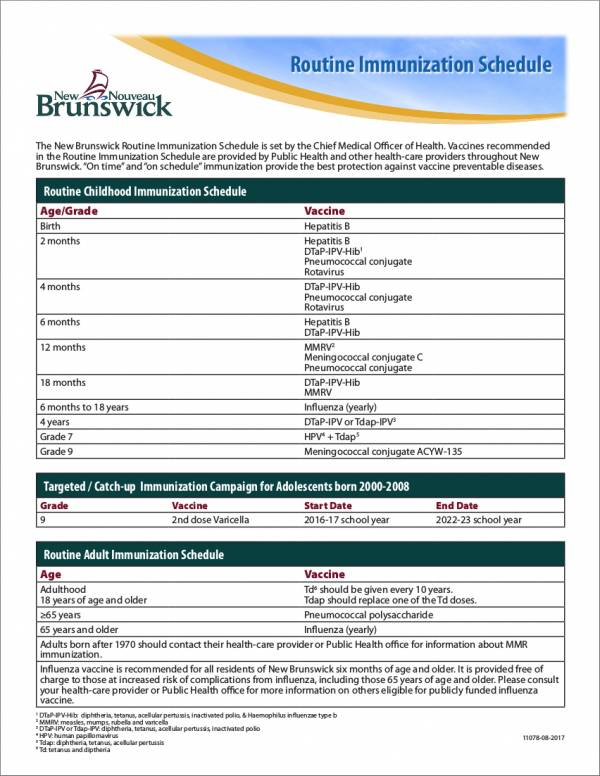Immediately after birth, babies are given shots to protect them from certain diseases that are deadly to them. These shots help babies create defenses against diseases so that they can also protect themselves. After the first shot, the baby will be scheduled for another set of shots together with other vaccines. It would be helpful to have a schedule template ready for use to help you remember the immunization schedule.
- Schedule Samples in Word
- Sample Schedules
Strictly following the specific schedule provided for each shot is very important to ensure that the protection needed by the baby is given at the right age and at the right time. If provided too soon, these shots may endanger the baby’s life. If provided too late, the shots given may not be effective anymore. Your child is important, so you need to keep track of their immunization schedule by using an immunization schedule sample.
Sample Immunization Schedule for Children
Recommended Routine Immunization
Immunization Schedule Template
Recommended Immunization Schedule
Routine Immunization Schedule Sample
Sample Immunization Schedule and Guidebook
What Is Immunization?
We have experienced getting sick once or twice in our lives. During those times, our bodies, specifically our immune system, would create antibodies to help us fight a particular disease and get better. Antibodies are naturally produced by our bodies when we are exposed to a particular disease for the first time. The next time we come across the same disease, we will not be affected as much as we already have antibodies for that same disease. You can also see vaccine order forms.
This is how we become immune to a lot of infectious diseases. But you don’t have to be sick just so your body can make the antibodies and get immune to the disease. There is another way of getting yourself immune to those diseases and that is through immunization. Immunization is a process that makes a person become immune or resistant to diseases that are infectious. Immunization is done by introducing weakened forms of viruses or bacteria into our bodies so that we can create the needed antibodies to fight off the virus or the bacteria.
An example would be the polio vaccine. In the past, a lot of people, including babies, have died because of polio before the vaccine was discovered. Weakened poliovirus is introduced into the human body so that we can create the needed antibodies to fight the virus. This is done so that a person who has contacted the virus will have a strong defense system against the disease, preventing disability and even death.
What Are Vaccines and Why Are They Needed?
Vaccines are weakened live viruses or bacteria that are used during immunization as shots to help or stimulate our immune system to produce antibodies against a particular disease. If you think of live viruses and bacteria introduced into your body, you would probably be scared to death.
You will for sure not let yourself or your family get vaccinated, ever! Don’t worry, though. Vaccines are live, but they are weakened bacteria and viruses, so weak that they can’t harm you or even babies. Why are they needed? Check out the benefits that they provide below.
- Vaccines are needed because they help us create antibodies against diseases without contacting the disease.
- There are diseases and viruses that are deadly and can kill us even when our antibodies are already at work. This is because it would take time for our body to determine the right antibody to produce and the bacteria or virus might be too strong for our body to fight the first time we get in contact with the disease.
- Vaccines can protect us from a wide variety of diseases, especially infectious and communicable diseases.
- Vaccines has helped in keeping the mortality rate of babies and young children low because of the shots that are given to them after birth.
There are still those people who doubt and are uneducated about vaccines. If you are a healthcare personnel, it is one of your responsibilities to impart health teachings to the community. You can use a health lesson plan as a guide on the topics you need to discuss.
Who Decides What Immunizations Children Need?
A vaccine needs to be approved and licensed by the Food and Drug Administration before it can be added to the list of vaccines to be added in the immunization schedule. But the process doesn’t stop there. Doctors and experts who work mostly with children do health assessments and research regarding the vaccine. They are the ones who decide on which vaccine to approve.
They also recommend the vaccine that is most helpful, effective, and less harmful. This is to ensure the safety of all the people who will be getting the vaccine, most especially those vaccines that are administered to babies and children. Before giving vaccines, the one administering should at least educate the patient or guardian about the vaccine they will be getting. Although not mandatory, a vaccine consent form should be signed prior to administration. This not only makes it a legal agreement but also to promote awareness.
Printable Immunization Schedule Sample
Immunization Record Schedule Sample
Adolescents Immunization Schedule Sample
Complete Immunization Schedule
Immunization Schedule for Vaccines
Childhood Immunization Schedule Sample
Is There a Need for Adults to Get Immunized?
At nine months old, babies are said to graduate from immunization as they take the last vaccine for babies, which is the anti measles vaccine or AMV. This is true for babies less than 1 year old, but this doesn’t mean that they don’t need and must not be vaccinated when they grow up.
Some vaccines might be too strong for babies to take, that is why they are recommended to be administered at a certain age. Adults also need vaccines. Completing immunization at an early age doesn’t mean that adults are protected from all types of infectious diseases. Some vaccines need to be reintroduced and there are also new vaccines that are necessary for adults. So is there a need for adults to get immunized? The answer is yes. Make a simple checklist on the immunizations you got to keep track of them.
Why Are There Vaccines That Require More Than One Dose?
Our immune system develops and weakens as we age. Babies have weak a immune system as it has not yet been fully developed. They rely on the care and protection given to them by their mothers to be able to survive. Babies are very susceptible to all kinds of diseases and giving them vaccines, even if they are weakened, may be fatal.
Because they still need the vaccine, it is introduced to them in little amounts within specific intervals. This way the baby will be able to create antibodies for the particular bacteria or virus and be prepared for the next set of vaccines so that it won’t kill them. This is applicable to young children and adults. Giving the vaccine all in one shot or in bulk is not safe, that is why the suggested dosage is divided in smaller doses before it is administered.
Why Is It Important to Follow the Schedule for Immunization and Not Give All Vaccines at the Same Time?
An immunization schedule is created because of the need to ensure that the individual who is going to receive the vaccine is ready for it, meaning that the individual needs to be at the right age for the right dosage and vaccines, and they have to be healthy enough to receive the vaccine. There are a number of vaccines that can be administered to an individual in one sitting. An example would be the immunization of babies. Babies get three hepatitis B shots; the first is administered after birth, and the second and third are scheduled after a couple of months.
The second hepatitis B shot is administered together with other vaccines like DPT and BCG. These vaccines are administered one at a time. They don’t have side effects when administered together with the hepatitis B vaccine, that is why it is recommended that they be provided on the same schedule. The immunization schedule that we are using today is the result of the careful study done by experts to save and improve lives.
What Is the Purpose of Following an Immunization Schedule?
You should follow an immunization schedule because of the following reasons:
- The purpose of an immunization schedule is to ensure that newborn babies and young children are protected from infectious diseases before they get exposed to them. This way their immune system can create the needed antibodies to give them protection and prevent life-threatening health conditions. Take a look at care plan samples to get you prepared.
- The purpose of an immunization schedule is to make sure that children and babies are immunized at the right age at the right time.
- The purpose of an immunization schedule helps determine when one’s immune system is ready to create new antibodies or receive another dose of the vaccine. It is not safe to overload one’s immune system, that is why there are intervals as to when the next dose should be provided. Jot down on a monthly planner when the doses are due.
- An immunization schedule reminds doctors and parents that a child or an individual is scheduled for a new vaccine or for the next dosage of the same vaccine making sure that they get the shot on schedule. Any delays in the administration of vaccines can put children at risk of diseases that can be easily prevented with vaccination.
Following schedules and being on schedule is very important regardless if it about immunization or not. Other schedule samples that you might find helpful are amortization schedule samples, meeting schedule samples, and class schedule sample.
Related Posts
FREE 10+ Gym Schedule Samples in PDF | MS Word | Apple Pages | Google Docs | Keynote |
FREE 10+ Daily Hourly Schedule Samples in PDF
FREE 10+ Weekly Schedule Template with Hours Samples in PDF
FREE 10+ 7 Day Weekly Schedule Samples in PDF
FREE 10+ Working Schedule Template Samples in PDF
FREE 6+ Preschool Schedule Template Samples in PDF
FREE 10+ Daily School Schedule Samples in PDF | MS Word | Google Docs | Google Sheets | Excel
FREE 10+ Day Schedule Samples in PDF
FREE 10+ Daily Work Schedule Samples in PDF
FREE 10+ 24 Hours Schedule Samples in PDF | Word | Google Docs | Google Sheets | Excel | Apple Numbers | Apple Pages
FREE 10+ Baseball Schedule Samples in PDF
FREE 10+ Availability Schedule Samples in PDF
FREE 10+ Weekly Cleaning Schedule Samples in PDF
FREE 8+ Employee Scheduler Template Samples in PDF
FREE 10+ Weekly Work Schedule Samples in PDF

